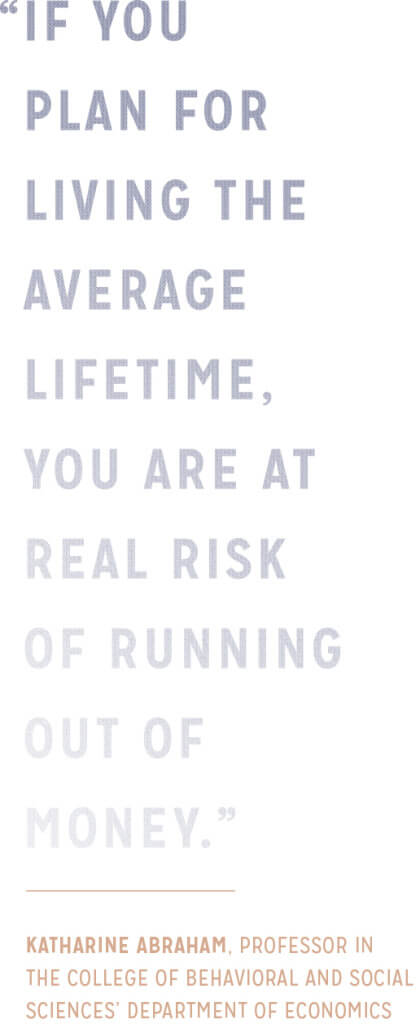- January 20, 2015
- By Liam Farrell
It’s a truism that we’re all really bad at predicting when we’re going to die. So bad, in fact, that it compounds our problems while planning for retirement.
Katharine Abraham, a professor in the College of Behavioral and Social Sciences’ Department of Economics, delved into this question as part of research into financial security and old age. Looking at data from the University of Michigan’s ongoing Health and Retirement Study, which began in 1992, Abraham and her co-author, Benjamin Harris of the Brookings Institution, were able to see how accurately people ages 58–61 could predict their chances of living to age 75.
As it turns out, even among people who thought they had no chance of making it to 75, about half of them did. In fact, nearly every category was outpaced: 60 percent of those who guessed their chances were a mere 10 percent survived; 71 percent of the 30 percent guessers did; and so did 75 percent of the 50 percent guessers. The numbers dipped only when participants gave themselves a near-certain chance of making it to their 75th birthday.
According to the Centers for Disease Control and Prevention, life expectancy in the United States is at a record high: 78.8 years.
“We are living longer,” Abraham says. “If you plan for living the average lifetime, you are at real risk of running out of money.”
Retirement is becoming increasingly complicated. The widespread replacement of employer-funded pensions with 401K plans puts more onus on individuals to put aside enough money to live comfortably in their later years. Many still struggle to do so—an October study by Wells Fargo found 34 percent of Americans, with a median household income of $63,000, weren’t setting aside any money for retirement, be it a 401K, IRA or other option; 19 percent had no retirement savings at all.
 Still, the balances in retirement savings accounts have grown over time. Increasingly, the challenge for those who have saved is to figure out the best way to use that money to enjoy a fulfilling—and secure—retirement.
Still, the balances in retirement savings accounts have grown over time. Increasingly, the challenge for those who have saved is to figure out the best way to use that money to enjoy a fulfilling—and secure—retirement.
Abraham thinks one way to help would be to increase the availability of so-called “longevity annuities.” These are policies that require individuals to make a onetime contribution, such as at age 65, and in return receive payments at an older threshold, such as 80 years old, thereby supplementing any other retirement savings or filling the void if they are exhausted.
“It could make it a lot easier for people to plan,” she says. “They could spend down their money without worrying if it was going to run out.”
Longevity annuities have not gained widespread popularity, though. Most employers don’t offer them and there is the human instinct of not wanting to hand over retirement money with no guarantee of ever seeing that money again.
Abraham says these problems illustrate how people need to be more educated as they plan their retirements. Longevity annuities are, essentially, just an insurance policy.
“If you think of these policies as an investment, it doesn’t make any sense,” she says. “But that’s not what they are.”
Tags
Research